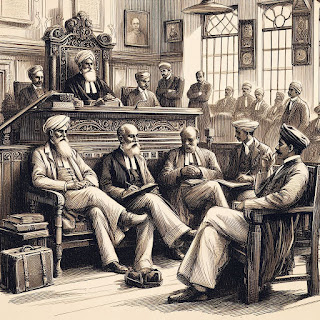A Law Unto Himself
A gentleman was placed in charge of the Magistrate's office at a certain military station. A man was hauled up before him on a charge of murder.
The Magistrate asked the accused why he committed the murder. The murderer deposed:-
"Your worship, I committed murder in a fit of anger. I was given grave provocation."
"You rascal," said the Magistrate, "don't you know it is a great crime to kill a human being? I shall give you a lesson that you will never think of murdering anybody in future. "koi hai?" (Is there anybody?")
"Hazir, Hurzar" (here at your service , my lord) cried a number of 'voices'-chaprasis and constables.
"Pull this devil by the ears," ordered the Magistrate, "and make him sit down and stand up one hundred times and then give him a good shoe-beating."
The accused cried out:
"Your Worship, I never killed anybody before, and I will never kill anyone in future. Pardon me this time. I am a poor man and it will be a great favour to me."
But the 'chaprasis' caught hold of him and began to carry out the Magistrate's ordered to the very letter. The man was crying bitterly and when the shoe-beating was nearly finished, the Magistrate cried out:-
"Now, you badmash (wicked man), will you kill any person again?"
"Never, never, Hazur," cried the culprit. "Never will I commit a murder as long as I live."
"Khabardar!" (take care) said the Magistrate, "if you do it again I will send you to jail."
Then he made the man take an oath thrice not to kill any body, and let him go.
When the accused had been released, the 'Munshi' (clerk) submitted to the Magistrate the Section of the Indian Penal Code, which provided capital punishment or transportation for life for the offence of murder.
"Oh! the Penal Code! said the Magistrate, "that blessed book was written while I was away on leave in England."


Comments